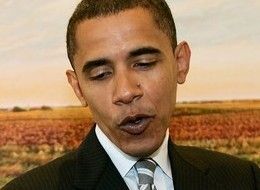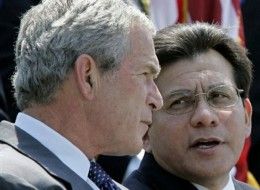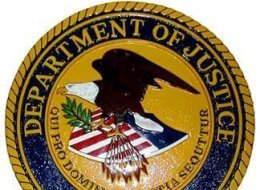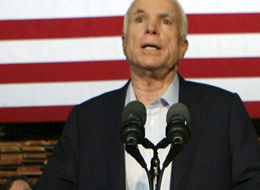The Justice Department investigation into the firings of nine U.S. attorneys has been extended to encompass allegations that senior White House officials played a role in providing false and misleading information to Congress, according to numerous sources involved in the inquiry.
The widened scope raises the possibility that investigators will pursue criminal charges against some administration officials, and recommend appointment of a special prosecutor if there is evidence of criminal misconduct.
The investigators have been specifically probing the role of White House officials in the drafting and approval of a Feb. 23, 2007 letter sent to Congress by the Justice Department denying that Karl Rove (President Bush's chief political adviser at the time) had anything to do with the firing of Bud Cummins, a U.S. Attorney from Arkansas. Cummins was fired in Dec. 2006 to make room for Tim Griffin, a protégé and former top aide of Rove's.
The February 23 letter stated, "The department is not aware of Karl Rove playing any role in the decision to appoint Mr. Griffin," and that the Justice Department was "not aware of anyone lobbying, either inside or outside of the administration, for Mr. Griffin's appointment."
Federal investigators have obtained documents showing that Kyle Sampson, then-chief of staff to Attorney General Alberto Gonzales, and Chris Oprison, then an associate White House counsel, drafted and approved the letter even though they had first-hand knowledge that the assertions were not true. The Justice Department later had to repudiate the Sampson-Oprison letter and sent a new one informing Congress that it could no longer stand by the earlier assertions.
The Justice Department's Inspector General (IG) and the Office of Professional Responsibility (OPR) are jointly conducting the current investigation. Both can initiate disciplinary action only against Justice Department employees and neither has prosecutorial powers.
People close to the investigation say that the investigators' final report will not only examine the reasons and circumstances behind the firings of the nine U.S. attorneys, but efforts by senior Justice Department and White House officials to mislead the public and Congress about the firings:
"It will be as much about the cover up as about the firings," said one former senior Justice Department interviewed at length because of his personal role in the firings. This source believes the investigators "are going to tell a narrative, and they have taken their investigation right into the White House."
If the IG and OPR believe that there is evidence of potential criminal wrongdoing, or evidence of wrongdoing by officials outside its jurisdiction altogether, they can recommend that the Justice Department initiate a criminal investigation.
If senior administration officials or White House officials come under suspicion, a special prosecutor would likely be named.
While a central focus for investigators apparently has been the role played by aides to Rove in the Griffin matter, some witnesses to the investigation told me that they have been asked specifically about Rove's own personal efforts.
Two former senior Justice Department officials, former Deputy Attorney General Paul McNulty and principal Associate General William Moscella, have separately provided damaging information to the two internal investigative agencies.
Both, according to sources familiar with their still-confidential testimony, said they inadvertently gave misleading testimony to Congress about the firings of the U.S. attorneys because they were misled by Rove himself in addition to other White House figures.
In his March 6, 2007, testimony to Congress, Moscella contended that all but one U.S. attorney was fired because of issues related to their performance. When specifically asked if Rove played any role in the firings, he testified: "I don't know that he played any role."
But one day before the congressional testimony, on March 5, 2007, McNulty and Moscella attended a strategy session at the White House in which they discussed Moscella's testimony and how he should answer allegations that most of the U.S. attorneys were fired because of politics.
McNulty and Moscella told investigators that among the attendees were Rove and Sampson, then Gonzales' chief of staff. Neither Rove nor Sampson, both men told investigators, told them anything about their own role in the firings even as they encouraged Moscella to say politics had nothing to do with it.
One senior Bush administration official told me that White House staffers talk about their "nightmare scenario" in which any one of the three currently internal DOJ probes "spins out of control" and leads to the appointment of a special prosecutor with broad authority.
And the probe by the Justice Department's IG and OPR and firings of nine U.S. attorneys is only one of three internal DOJ investigations that have the potential of morphing into criminal probes of the Bush administration--and even the appointment of a special prosecutor. DOJ's IG is probing whether former Attorney General Gonzales testified truthfully to Congress about the administration's warrantless electronic eavesdropping program. A probe by OPR is investigating whether government attorneys acted within the law in authorizing and overseeing the eavesdropping program.
Former and current Justice Department investigators caution against assuming that just because White House officials are being scrutinized, a criminal investigation or one conducted by a special prosecutor will be the likely result. They noted that the threshold for initiating a criminal probe is relatively high, and the standard for appointing a special prosecutor even higher.
They also said that cases involving false statements to Congress are considered by prosecutors one of the most difficult to prove, which in turn could lead officials to be reluctant to act in either requesting a criminal probe or pressing for a special prosecutor in the first place.
A spokesman for the Inspector General declined to comment about any aspect of the investigation because the probe is still ongoing.
***
Apparently, advances in the investigations have been spurred by key emails that the Bush administration has withheld from Congress--claiming executive privilege--and that have now been obtained by DOJ investigators.
Among other things those documents show that Oprison, the associate White House counsel, knew that Rove was involved in the US Attorney firing when he reviewed drafts of the letter and approved final language claiming Rove was not involved.
Some of these emails withheld from Congress based on claims of executive privilege were provided to me by an administration official for this National Journal story posted on May 10,, 2007.
Additional emails and other material withheld and not provided to Congress were made available to me for this story.
A senior Justice Department official said in an interview that it was the discovery of a December 19, 2006, e-mail from Sampson to Oprison--in which Sampson wrote that "getting [Griffin] appointed was important" to Rove and to then-White House Counsel Harriet Miers--that prompted the Justice Department to repudiate the February 23, 2007 letter to four Senate Democrats.
The Dec. 19, 2005 email clearly suggests that both Sampson and Orpison had reason to believe that the letter that Sampson drafted and Oprison edited and approved was false.
Confronted with the email after it was made public, Sampson was asked during testimony before the Senate Judiciary Committee on March 27, 2007 whether Rove had advocated for Griffin to be made a U.S. attorney:
"I knew that [then-White House political director] Sara Taylor and [Taylor's then deputy] Scott Jennings had expressed interest in promoting Mr. Griffin for appointment to be U.S. attorney, and I assumed, because they reported to Karl Rove, that he was interested in that," Sampson testified.
So why did Sampson draft and approve the letter saying that there had been no involvement by Rove?
His explanation to the Senate Judiciary Committee was this: "In February, when I participated in the drafting of that [February 23] letter, I did not remember then ever having talked [directly] to Mr. Rove about it. I don't remember now ever having talked to Mr. Rove about it. I'm not sure whether Mr. Rove was supportive of Mr. Griffin's appointment."
Before drafting the letter, Sampson made no further effort to talk to Rove, Taylor (who as White House Political Director was Rove's top aide), or to Jennings as to whether the allegations were true, Sampson's attorney Brad Berenson told me in an interview.
Sampson did, however, send the letter to the White House for Oprison for review. According to Berenson, in sending the letter, Sampson was relying on Oprison to see that it was accurate. Berenson told me:
"Kyle didn't want to traffic in assumptions, so he circulated the letter to the White House for confirmation whether what he believed to be true was accurate or not. He drafted the letter according to his understanding of the facts, and he circulated it beforehand to other people for clearance to assure that it accorded with their understanding of the facts."
Why did Oprison in turn approve the letter to be sent knowing what he knew?
Tony Fratto, a White House spokesman, told me that Oprison "had no reason to believe" that the reference to Rove was inaccurate and cleared the letter. Asked about the December 19 e-mail in which Sampson told Oprison that Griffin's appointment was important to Rove and Miers, Fratto said: "Chris did not recall Karl's interest when he reviewed the letter."
Oprison, in turn, consulted with White House Counsel Fred Fielding and Deputy White House Counsel Bill Kelley in approving the draft of the letter, according to a review of White House records undertaken in response to questions for this story.
Did Oprison, Fielding, or Kelly think to seek out Rove and Rove aides Taylor and Jennings to see if they played any role in seeking Cummins to be fired and Griffin named to replace him?
Fratto told me that Oprison and others in the White House counsel were relying on Sampson that such was not the case: "We have no record of that letter even leaving the White House counsel's office."
****
Sampson also played a central role in the drafting of a January 31, 2007 letter from acting Assistant Attorney General Richard Hertling to Sen. Mark Pryor (D-AR) implying that the White House had never contemplated using an obscure provision in the USA PATRIOT Act to install Griffin as a U.S. attorney without Senate confirmation.
Gonzales and Sampson later changed course completely--when confronted with evidence to the contrary--and testified to the Senate Judiciary Committee that the Bush administration did indeed consider using the PATRIOT Act to install Griffin as a federal prosecutor.
Under an obscure provision in the act, the President had authority to permanently install interim U.S. attorneys without their being confirmed by the Senate. Pryor suspected that this was exactly what was going on--which later turned out to be the case. But the Bush administration still misled him into thinking otherwise.
Records withheld from Congress by the Bush administration because of claims of executive privilege--but allowed to be reviewed by IG and OPR investigators--show that Oprison once again assisted Sampson in drafting the response to Congress.
Despite the fact that Justice Department records show that Sampson and Oprison worked closely together devising the original plan to install Griffin as U.S. attorney under the PATRIOT Act provisions, both men helped write a letter to Congress saying that such plans never existed.
The January 31, 2007 letter to Pryor contended that "not once" had the Bush "administration sought to avoid the Senate confirmation process" by exploiting the PATRIOT Act.
In drafting the letter, Sampson consulted with Sara Taylor. Taylor had been aware of the possible use of the PATRIOT Act to permanently install Griffin, according to withheld administration papers.
In an e-mail to Sampson, after it appeared that Griffin's appointment as U.S. attorney was in trouble, Taylor wrote: "I'm concerned we imply that we'll pull down Griffin's nomination should Pryor object."
A senior executive branch official who read the e-mail said that it demonstrates that Taylor signed off on the letter despite the fact that she, Oprison, and other White House officials knew that the administration had indeed considered using the PATRIOT Act to make Griffin a U.S. attorney.
Fratto, the White House spokesman, contends that the email does not show that Taylor wanted to utilize the PATRIOT Act to appoint Griffin but instead only indicated that Taylor wanted Griffin confirmed the ordinary way. "We battle with the Senate with nominations every day," Fratto said. "It is very important to us.... That's what Sara was saying: 'We shouldn't imply we're willing to walk away from the nomination.'"
But sources familiar with Sampson's interview with Justice's Inspector General tell me that Sampson told quite a different story: that Taylor, Jennings, and Oprison all had repeatedly pressed him to utilize the PATRIOT Act to install Griffin and other potential U.S. attorney candidates without Senate confirmation.
Documents made public after Sampson, Taylor, and Oprison collaborated on their letter to Pryor indicate that Sampson himself wanted to invoke the PATRIOT Act to install Griffin--party because he thought it was important to Rove.
On December 19, 2006, Sampson e-mailed Oprison with his own detailed strategy to have Griffin stay permanently as U.S. attorney, utilizing the PATRIOT Act: "I think we should gum this to death... ask the Senators to give Tim a chance. meet with him. give him some time in office to see how he performs, etc. they ultimately say, 'no never' (and the longer they forestall the better). Then we can tell them we'll look for other candidates, and otherwise run out the clock. All of this should be done in 'good faith' of course."
By that time, Griffin would have been able to serve out the remainder of the Bush administration because of his appointment as interim U.S. attorney under the emergency provisional authority of the PATRIOT Act.
Sampson added in his e-mail: "The only thing really at work here is a repeal of the AG's appointment authority. There is some risk that we'll lose that authority, but if we don't ever exercise it then what's the point of having it."
Then Sampson concluded his email by saying: "I'm not 100 percent sure that Tim was the guy on which to test drive this authority, but know that getting him appointed was important to Harriet, Karl, etc.," The reference is to Harriet Miers and Karl Rove.
The day after the email was sent, Cummins formally resigned as U.S. attorney and Griffin was named as his interim replacement. Cummins told me that officials at Justice sped up the timetable on his departure, going so far as to call him on a cell phone when he was on a hunting trip with his son to say he must leave on December 20. The abrupt demand for Cummins' departure on that date appears to indicate that Sampson and the White House were attempting to implement their plan.
Berenson, Sampson's attorney, told me that the letter Sampson had helped draft and approved to be sent to Congress was technically accurate because Sampson and Oprison never ultimately implemented the plan to install Griffin as U.S. attorney through the PATRIOT Act provision. "The principals never adopted it, and it was never done," Berenson said. "The statement in the letter is accurate."
***
It is still unknown what conclusions the Inspector General will reach in his much anticipated forthcoming report on the firings of nine U.S. attorneys.
But it is clear that a priority for his investigation is whether top Justice Department political appointees and senior White House officials purposely mislead Congress about the firings. Many of those whose conduct has been scrutinized have had senior positions in the administration or the White House: Kyle Sampson was the chief of staff to the Attorney General of the United States. Sara Taylor was White House political director. Scott Jennings was Taylor's deputy as well as a top aide to Rove. And Karl Rove is, of course, Karl Rove.
Several of those people, under federal regulations, could be the subject of an investigation by a special prosecutor if Fine believes there is evidence of potential crimes.
At a minimum, if two other reports that Inspector General Fine has already made public about the politicization of the Justice Department during the Bush administration are any guide, the report on the firing of nine U.S. attorneys will be scathing and contain new disclosures embarrassing to the White House.
Whether the fears of administration officials--their "nightmare scenario" of top White House officials having to face a criminal investigation or even be probed by a special prosecutor turns out to be the case--remains to be seen.
Original here




 U.S. President George W. Bush delivers a speech at the Queen Sirikit National Convention Center in Bangkok on Thursday ahead of his visit to Beijing. (Gerald Herbert/Associated Press)
U.S. President George W. Bush delivers a speech at the Queen Sirikit National Convention Center in Bangkok on Thursday ahead of his visit to Beijing. (Gerald Herbert/Associated Press)


 He turns as a large uniformed man lunges at him. The backpack!” the man yells, pushing Usman against the Italianate gates in front of Treasury and ripping off his backpack. Another officer on a bicycle arrives from somewhere and tears the backpack open, dumping its contents on the sidewalk. […]
He turns as a large uniformed man lunges at him. The backpack!” the man yells, pushing Usman against the Italianate gates in front of Treasury and ripping off his backpack. Another officer on a bicycle arrives from somewhere and tears the backpack open, dumping its contents on the sidewalk. […]




